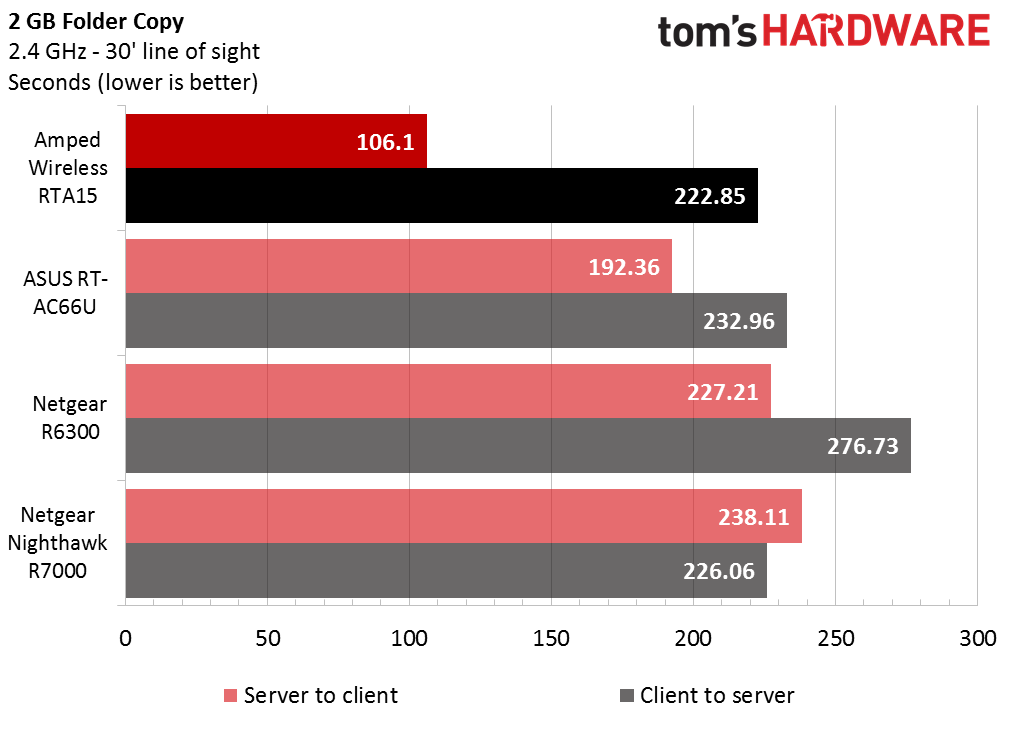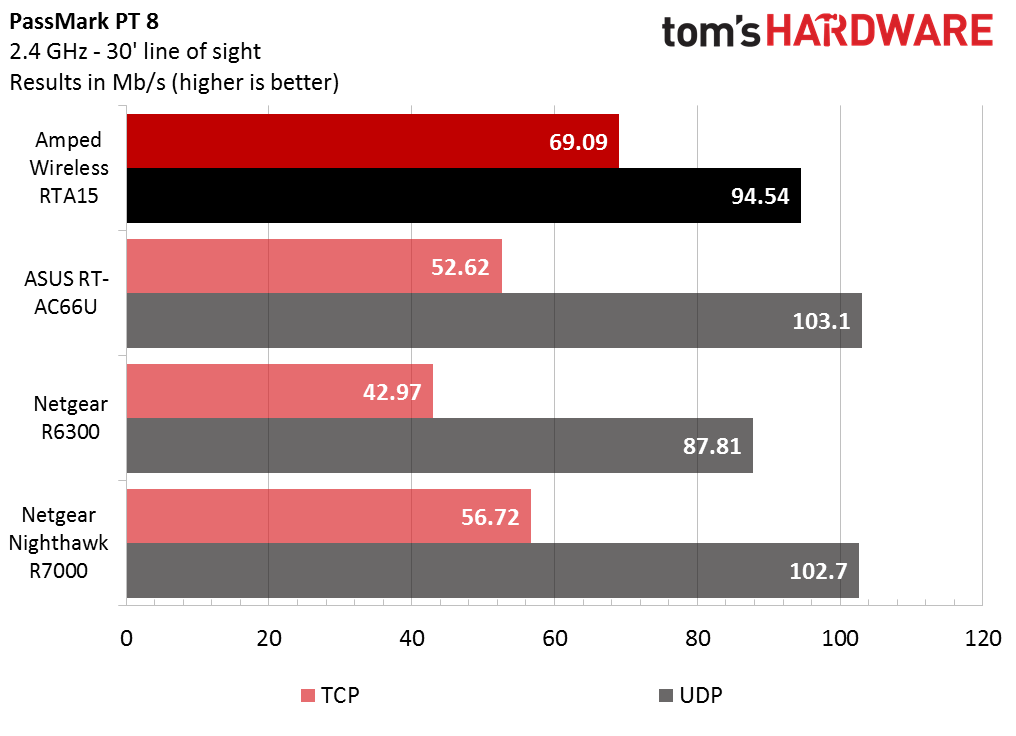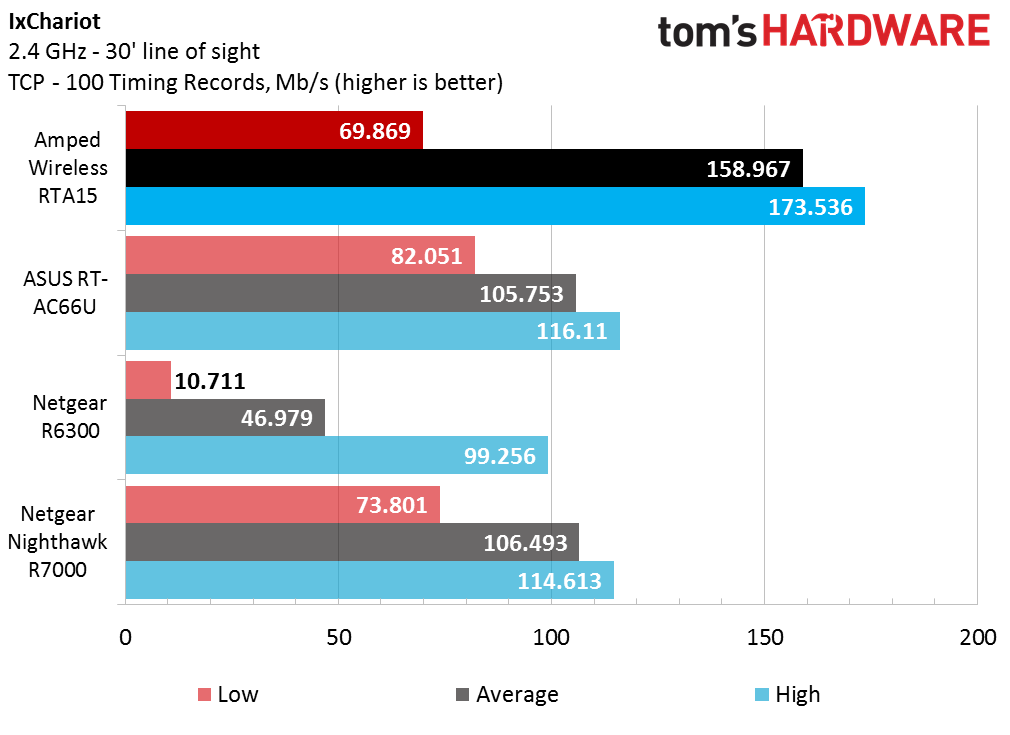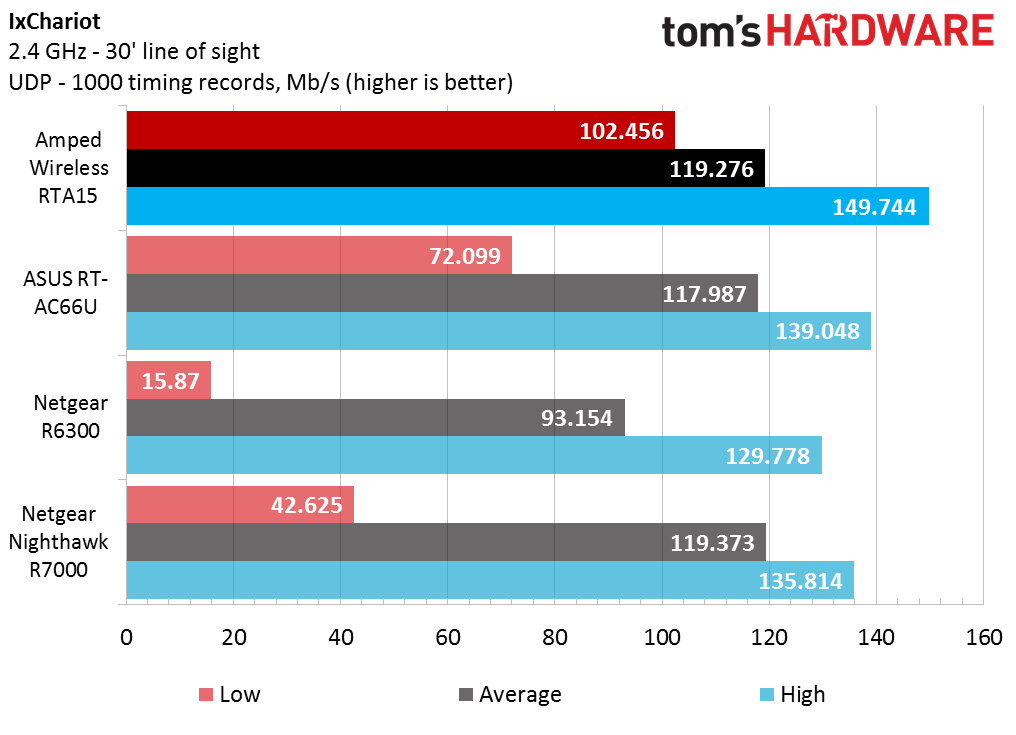802.11ac Wi-Fi Router Testing: Interference And Workloads
Baseline 2.4GHz Tests
Even though Amped stumbled in our last benchmark, it nails this 2GB transfer, keeping even with the field on the client-to-server half and knocking it out of the park when copying from server to client. Asus comes in a somewhat distant second. Our Netgear R6300 exhibits oddly poky client-to-server performance, but we’ll soon see if this is a problem or only an anomaly.
In this close PerformanceTest race, victory again goes to the Amped RTA15. This was not one of those times where UDP traffic suffered on the device. While it did come in third place out of four on UDP, it still beat the 3x3 R6300 and turned in the highest TCP performance. The RTA15 walked away with the highest combined score in this test. In our minds, this lays to rest any speculation of a possible superiority in 2.4GHz performance in AC1900 over AC1750 in the absence of a 256-QAM-enabled client. The surprising part is that a 2x2 router snubbed three 3x3 routers on this score, and that’s with the Nighthawk boasting about its beam-forming capabilities. Apparently, sometimes power does matter more.
Once again, Amped hits it out of the park. Its 2.4GHz TCP performance in IxChariot reveals a decent throughput floor, but sustained transfer rates run so close to the peak that the average score is nearly 50% greater than its peers. Meanwhile, the R6300 limps along at less than half of the average rate of Asus and the Nighthawk, with a bottom speed that’s downright atrocious in same-room conditions.
Amped surrenders its clear lead when we switch to UDP traffic, but it still squeaks past the Nighthawk, largely on the strength of its markedly faster lowest throughput rate. The R6300 again turns in a pitiful showing on its bottom data rate, although its top rate is largely in line and enough to make its average tolerable (although still last). The message we take away from this chart is that average 2.4GHz UDP performance is fairly even across all four routers, a condition we see echoed in the PerformanceTest results.
Get Tom's Hardware's best news and in-depth reviews, straight to your inbox.
Current page: Baseline 2.4GHz Tests
Prev Page Baseline 5GHz Tests Next Page Performance Without Encryption-
jacobian In "How we tested" you didn't specify what kind of wi-fi hardware the test clients had. Was it PCIe or USB network adapter? What kind of MIMO setup, e.g. 3x3 or 2x2?Reply
-
chimera201 I would like to see tear-down of routers to see the components for making a guess at longevity.Reply -
CaedenV This was a much better test setup, and a really interesting read. Only complaint was that the nighthawk may have an unfair advantage in the interferance tests compared to the other units as it went up against the 66U instead of another nighthawk. Perhaps you could dig up a 5GHz N router to act as a standard interference device next time? Or find a cheap AC router? It would make it a much better apples-to-apples comparison.Reply
At any rate, great article! I will certainly send this to my more tech-savvy friends who are looking to upgrade from N right now. I have the 66U in my own home and this seems to be spot-on which what I experience relating to distance and obstructions. It is not necessarily the fastest router on the market, but it is nice an consistent which has merits. -
dgingeri Home router security is so poor, I wouldn't even think of using one. Let me guess, they all have WPS, right? HUGE security hole that nobody ha made one little tiny step in fixing, and is "featured" on nearly every home router.Reply -
Larry Litmanen I use to have constant WiFi issues, one day i went out and got the best router i could, still had issues. Calling them for support was hell, 45 minutes on the phone just to be told "Sorry sir but there's nothing wrong with our router, your internet is down".Reply
I found out that my cable/internet company provides a free router, they hooked it up..............no issues since. Heck they just gave me a free AC router that can be controlled from internet.
I will not be buying any more routers. -
@dgingeri, I've never seen a router that didn't have the option to disable WPS. And WPS is better than nothing for non-technical people.Reply
Cool article. -
dgingeri Reply15852608 said:@dgingeri, I've never seen a router that didn't have the option to disable WPS. And WPS is better than nothing for non-technical people.
Cool article.
WPS can't be turned disabled by software. That's the big problem with it. My last two routers and one AP got hacked through WPS, even though it was disabled in software. That's when I learned that it doesn't actually get turned off. The only way to protect against the WPS security hole is if the software running the router or AP doesn't support WPS. This can be done by either getting an AP or router without that feature (quite difficult and rather expensive) or putting an opensource software on your router that doesn't have support for WPS (more difficult, but somewhat less expensive.)
As for "better than nothing for non-technical people", that's pretty much asinine. That's like saying "someone can't operate the key, so we'll leave this side door open." -
dgingeri Reply15852434 said:I use to have constant WiFi issues, one day i went out and got the best router i could, still had issues. Calling them for support was hell, 45 minutes on the phone just to be told "Sorry sir but there's nothing wrong with our router, your internet is down".
I found out that my cable/internet company provides a free router, they hooked it up..............no issues since. Heck they just gave me a free AC router that can be controlled from internet.
I will not be buying any more routers.
Did you know the ISP free routers have a back door for support purposes. They couldn't support them if they didn't have that back door. The big problem with that is that every support person, and former support person, for that company knows that back door. A vengeful or malicious former employee could easily hack into any customer's router and insert tracking software or "listen in" on the internet traffic, capturing all your passwords. They also have other massive security holes. ISPs patch their router firmware for bugs or security holes even less often than home router manufacturers. They aren't safe.
-
liquidpower this is the most important part of the Client how could you not included it?ReplyIn "How we tested" you didn't specify what kind of wi-fi hardware the test clients had. Was it PCIe or USB network adapter? What kind of MIMO setup, e.g. 3x3 or 2x2?
-
bikeracer4487 So in the "Performance without Encryption" section, in the very first test you test how long it takes to copy a 2GB folder, with the results measured in seconds. The AC66U wins with the lowest time, and the R6300 having the SLOWEST time...and yet you wrote this: "The exception is the R6300, which takes a 10% to 20% jump. This is a strong enough leap to propel it into first place in our test. Could it be that the R6300 is in fact a far more capable speedster being held back by encryption processing? Or is it just luck and variable ambient test conditions?"Reply



